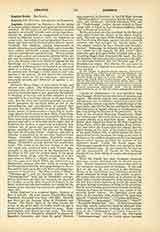

Le Fevre, JACQUES, a French theologian and controversialist, b. at Lisieux towards the middle of the seventeenth century; d. July 1, 1716, at Paris. He became archdeacon of his native city and vicar-general of the Archbishopric of Bourges, and in 1674 received the doctorate in theology from the Sorbonne. His works are the following: “Entretiens d’Eudoxe et d’Euchariste sur les histoires de l’arianisme et des iconoclastes du P. Maimbourg” (Paris, 1674). The first of these dialogues was condemned and burned. “Motifs invincibles pour convaincre ceux de la religion pretendue reformee” (Paris, 1682), in which Le Fevre endeavors to show that there is fundamental agreement between Catholic and Protestant teachings, the differences being of slight importance and mostly verbal. These conciliatory views were attacked by Arnauld, and, in answer, Le Fevre wrote “Replique a M. Arnauld pour la defense du livre des motifs invincibles” (1685). Amongst Le Fevre’s other works are: “Conference avec un ministre touchant les causes de la separation des protestants” (Paris, 1685); “Instructions pour confirmer les nouveaux convertis dans la foi de l’eglise” (Paris, 1686); “Recueil de tout ce qui s’est fait pour et contre les protestants en France” (Paris, 1686); “Lettres d’un docteur sur ce qui se passe dans les assemblees de la faculte de theologie de Paris” (Cologne, 1700). These letters were published anonymously when the work of the Jesuit Father Lecomte, “Memoires sur la Chine”, was referred to the faculty of theology. To Father Lallemant, who had defended his confrere in the “Journal historique des assemblees tenues en Sorbonne“, Le Fevre replied in his “Anti-journal historique …”; and he also produced “Animadversions sur l’histoire ecclesiastique du P. Noel Alexandre”, the first volume of which was printed at Rouen without date about 1680; it was seized and destroyed, and the other volumes were not published.
C. A. DUBRAY

